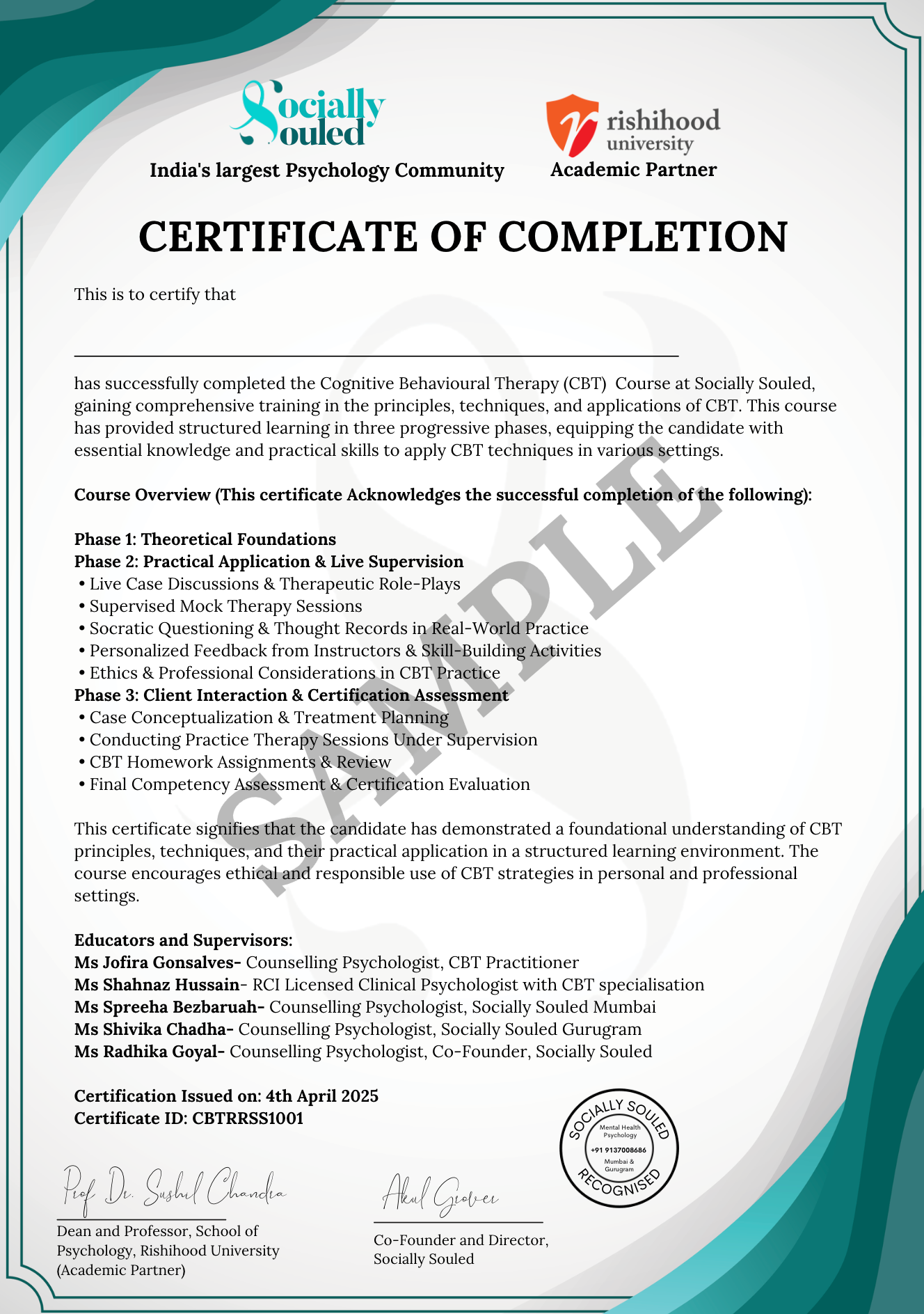Cognitive Behaviour Therapy (CBT) Course
Why Choose This Program?
Program Structure: A 3-Phase Learning Experience
-
Self-Paced Learning (Phase 1)
Learn the Theory -
Live Training (Phase 2)
Practice the Skills -
Supervised Cases (Phase 3)
Gain Real World Experience
Takeaways that students took
Phase 1: Self-Paced Learning (Theory & Foundation)
📌 Objective: Build a strong theoretical foundation in CBT before diving into practical applications.
✔ Bite-Sized Video Lessons: Learn at Your Own Pace with structured pre-recorded modules.
✔ Downloadable CBT Workbooks & Cheat Sheets
✔ Quizzes & Thought Exercises for Better Retention
✔ Journaling Templates for Thought Restructuring
Exclusive Access to Our Learning Management System (LMS)
Topics Covered:
- Introduction to CBT – Understanding its origins and applications.
- The CBT Model – How thoughts, emotions, and behaviors interact.
- Cognitive Distortions – Identifying and restructuring negative thinking patterns.
- Thought Records & Restructuring – Step-by-step application for clients.
- ABC Model – Breaking down Activating Events, Beliefs, and Consequences.
- Behavioral Experiments – Practical ways to test and challenge thoughts.
- Exposure Therapy – Learning how to handle phobias and anxiety.
- Goal Setting & CBT Homework Assignments for Clients.

Educators & Supervisors
Ms Jofira Gonsalves- Counselling Psychologist, CBT Practitioner
Ms Shahnaz Hussain- RCI Licensed Clinical Psychologist with CBT specialisation
Ms Spreeha Bezbaruah- Counselling Psychologist, Socially Souled Mumbai
Ms Shivika Chadha- Counselling Psychologist, Socially Souled Gurugram
Ms Radhika Goyal- Counselling Psychologist, Co-Founder, Socially Souled
Phase 2: Live Training & Skill Development
📌 Objective: Take your learning to the next level with interactive live training, role-plays, and case discussions.
✔ Live Classes (Practical Focus, No Lectures!)
✔ Breakout Room Activities & Small Group Exercises.
✔ Live Demonstrations & Case Reviews by Trainers.
✔ Personalized Feedback on Your CBT Skills.
Topics Covered in Live Training:
- Case Study Analysis – Breaking down client cases in real time.
- Live Q&A with Instructors – Clarify doubts from self-paced learning.
- Therapy Demonstrations – Watch expert-led sessions & techniques.
- Mock Therapy Sessions – Practicing CBT interventions in role-play settings.
- Guided Supervision & Peer Learning – Group discussions & structured feedback.
- Specialized Training on Anxiety, Depression, and Trauma Applications.
Phase 3: Supervised Casework & Certification
📌 Objective: Ensure students transition from learning to real-world therapy experience.
✔ Direct Trainer Feedback on Your Sessions.
✔ Case Study Reviews & Real-World Problem Solving.
✔ Supervised Skill Development & Therapist Growth.
Supervised Practice & Certification Requirements:
- Conduct 5 Therapy Sessions with Clients (Live or Simulated).
- Submit Session Notes & Case Reports for Trainer Evaluation.
- Develop a Treatment Plan & Case Conceptualization.
- Participate in Supervision Calls & Peer Reviews.
- Pass the Final Competency Assessment for Certification.
Sample Certificate and it's applications:
Deepen Your Expertise in Therapy & Counseling
Build a Strong Foundation for Advanced Studies & Practice
Work Alongside Licensed Therapists in Mental Health Settings

Enhance Coaching, Education & Mental Wellness Initiatives
Facilitate Mental Health Workshops & Community Sessions
Apply CBT in Everyday Life & Career Growth

What You Get with This CBT Training Program
- Comprehensive Learning in 3 Phases – Theory, Practical Training & Real-World Application.
- Access to LMS with Downloadable CBT Workbooks & Journaling Templates.
- Live Training with Role-Plays, Case Discussions & Q&A Sessions.
- Hands-On Supervised Therapy Practice with Real Clients.
- Mentorship & Support from Industry Experts.
- Official Certification Recognized for Career Growth.
Takeaways that students took
Who is This Course For?
-
Psychology Students and Graduates
Looking for practical CBT training. -
Counselors & Mental Health Professionals
Wanting to enhance their CBT skills. -
Social Workers and Educators
Applying CBT principles and techniques in community settings. -
Anyone Interested in CBT
Seeking structured training to understand and apply CBT techniques.
Frequently Asked Questions (FAQs)
-
The program is self-paced + live training. On average, students complete it in 3-4 months, depending on how quickly they move through the phases.
-
No, this course is beginner-friendly! Whether you're new to CBT or already working in psychology, this structured program helps you build and refine your skills.
-
All live classes are recorded and uploaded to our LMS. You can access them anytime. -
Yes, the course is designed to provide you with actionable skills and techniques that can be immediately implemented in your clinical practice. Case studies, role-playing, and interactive sessions facilitate hands-on learning that ensures you can apply the concepts effectively.
-
In Phase 3, you’ll conduct live therapy sessions and submit recordings for trainer feedback. You’ll also participate in weekly supervision calls for structured guidance.
-
- After completing the course, participants may have access to a community forum for ongoing discussion, periodic webinars for course alumni, and opportunities for supervision or consultation on challenging cases.














